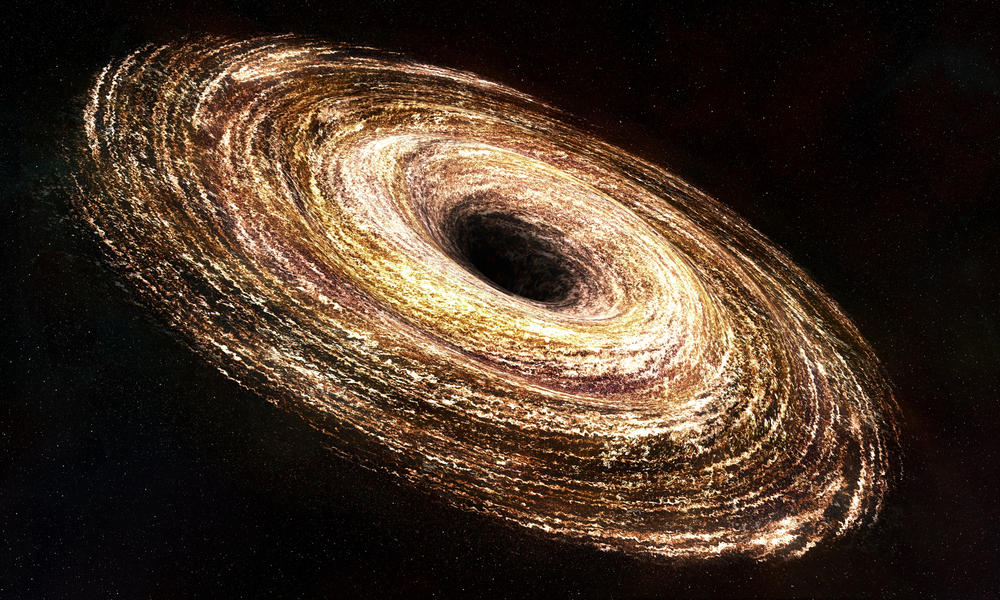Physics professor says she has proof that black holes don't exist


A free daily email with the biggest news stories of the day – and the best features from TheWeek.com
You are now subscribed
Your newsletter sign-up was successful
Black holes have inspired everything from sci-fi films to questionably racist greeting cards — which is all the more surprising considering that, according to one scientist, they may not even exist.
Laura Mersini-Houghton, a physics professor at the University of North Carolina at Chapel Hill, says she has mathematic proof that black holes "can never come into being in the first place," according to a statement from the university. Black holes, scientists have long believed, are the "ultimate unknown," because they are "the blackest and most dense objects in the universe." Mersini-Houghton, though, wants to disprove common ideas about the elusive black holes.
Mersini-Houghton looked at two leading theories of the universe, Einstein's theory of gravity and a fundamental law of quantum theory. The theories appear to contradict each other — the quantum theory law says that "no information from the universe can ever disappear," while Einstein's theory "predicts the formation of black holes." But Mersini-Houghton has merged what was known as the "information law paradox," and her findings will make scientists "reimagine the fabric of space-time" and "rethink the origins of the universe," according to the university.
The Week
Escape your echo chamber. Get the facts behind the news, plus analysis from multiple perspectives.

Sign up for The Week's Free Newsletters
From our morning news briefing to a weekly Good News Newsletter, get the best of The Week delivered directly to your inbox.
From our morning news briefing to a weekly Good News Newsletter, get the best of The Week delivered directly to your inbox.
"I'm still not over the shock," Mersini-Houghton said in the statement. "We've been studying this problem for more than 50 years, and this solution gives us a lot to think about."
Previous thought suggests that black holes form when stars collapse, and their gravitational pull creates the black hole. Stephen Hawking proved that black holes release radiation, and Mersini-Houghton has built on Hawking's ideas. She argues that when stars release radiation, they also lose mass — so much mass, in fact, that the star wouldn't have enough density to ever become a black hole.
"Physicists have been trying to merge these two theories — Einstein's theory of gravity and quantum mechanics — for decades, but this scenario brings these two theories together, into harmony," Mersini-Houghton said in the statement. "And that's a big deal."
A free daily email with the biggest news stories of the day – and the best features from TheWeek.com
Meghan DeMaria is a staff writer at TheWeek.com. She has previously worked for USA Today and Marie Claire.
-
 Crisis in Cuba: a ‘golden opportunity’ for Washington?
Crisis in Cuba: a ‘golden opportunity’ for Washington?Talking Point The Trump administration is applying the pressure, and with Latin America swinging to the right, Havana is becoming more ‘politically isolated’
-
 5 thoroughly redacted cartoons about Pam Bondi protecting predators
5 thoroughly redacted cartoons about Pam Bondi protecting predatorsCartoons Artists take on the real victim, types of protection, and more
-
 Palestine Action and the trouble with defining terrorism
Palestine Action and the trouble with defining terrorismIn the Spotlight The issues with proscribing the group ‘became apparent as soon as the police began putting it into practice’
-
 Nobody seems surprised Wagner's Prigozhin died under suspicious circumstances
Nobody seems surprised Wagner's Prigozhin died under suspicious circumstancesSpeed Read
-
 Western mountain climbers allegedly left Pakistani porter to die on K2
Western mountain climbers allegedly left Pakistani porter to die on K2Speed Read
-
 'Circular saw blades' divide controversial Rio Grande buoys installed by Texas governor
'Circular saw blades' divide controversial Rio Grande buoys installed by Texas governorSpeed Read
-
 Los Angeles city workers stage 1-day walkout over labor conditions
Los Angeles city workers stage 1-day walkout over labor conditionsSpeed Read
-
 Mega Millions jackpot climbs to an estimated $1.55 billion
Mega Millions jackpot climbs to an estimated $1.55 billionSpeed Read
-
 Bangladesh dealing with worst dengue fever outbreak on record
Bangladesh dealing with worst dengue fever outbreak on recordSpeed Read
-
 Glacial outburst flooding in Juneau destroys homes
Glacial outburst flooding in Juneau destroys homesSpeed Read
-
 Scotland seeking 'monster hunters' to search for fabled Loch Ness creature
Scotland seeking 'monster hunters' to search for fabled Loch Ness creatureSpeed Read
